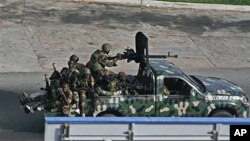Humanitarian agencies are rushing to help thousands of displaced people in Ivory Coast who are in urgent need of assistance. Tens of thousands, for example, have crowded around a Catholic mission in the western town of Duekoue. Too many for what little food and water are available.
Jean-Philippe Chauzy, spokesman for the International Organization for Migration, said, “Currently, IOM has deployed in Duekoue, alongside Caritas, colleagues from UNHCR and the World Food Program, and what we’re doing at the moment is carrying out the very first registration of the displaced. Obviously, the needs are enormous. Access to potable water remains very difficult and also to latrines. Obviously, action will be taken to and prevent the spread of diarrheal diseases.”
Decongest
The IOM and its partners want to “decongest” the Catholic mission.
“The number of displaced people in Duekoue, including mostly in the Catholic mission, is still estimated to be in excess of 20 to 25,000 people,” he said,” adding, “We’re trying to identify a site in Duekoue where we could basically settle those displaced.”
There’s also word of hundreds of other displaced people seeking shelter at a Protestant center in Duekoue. “There again,” said Chauzy, “they need everything in terms of food, medical assistance, access to water, etc.”
Distribution of humanitarian assistance in Duekoue is expected with 24 hours.
On the road
Thousands of displaced people were also reported on the road between Duekoue and Guiglo.
“What we do know as of yesterday, Sunday, was that about 370 of those displaced people managed to get to another mission somewhere on the road between Duekoue and Guiglo. This is a mission that is being run by some Capuchin priests. The information that we’re getting from that particular congregation is that there’s an urgent need for assistance. As for the remaining 3,000 plus people, we have no specific information,” he said.
Aid agencies are still unable to access the road taken by the displaced and so cannot provide an update on their whereabouts or condition.
Chauzy said, “It’s a fair bet people have dispersed in the surroundings of the road. We need to try and organize an evaluation mission on that particular road.”
Mass killing
Over the weekend, the International Federation of the Red Cross said about 800 civilians had been killed in one section of Duekoue. Forces loyal to U.N. backed president-elect Alassane Ouattara took over the area last week, but they deny being responsible for the deaths.
“Developments in the neighborhood of Carrefour still represent a challenge. An investigation is ongoing from my understanding. I think the U.N. is basically now deploying personnel in that particular district. But for the moment our attention is focused on providing assistance to those displaced by the events in Duekoue and hopefully very soon in the neighboring town of Guiglo,” said Chauzy.
As for Abidjan……
The IOM said it’s been unable to evacuate foreign nationals from Abidjan, many of whom are in hiding.
“Quite literally, everyday we’re hearing about various groups…migrant workers that are stranded in the economic capital,” he said.
For example, 2,000 Malian nationals are reported encamped around the Malian embassy.
“They have received absolutely no assistance now for the past week. No food, for instance. These were people who until about a week ago were able to get out of the embassy and go and buy food in the surrounding neighborhood,” he said, “Because of the fear of attacks, those Malian nationals are basically hunkered up in the embassy,” he said.
There are also hundreds of Mauritanians who are stranded at their country’s embassy.
Chauzy said, “It’s very difficult for us, obviously, under current circumstances, to operate an evacuation program. What we are trying to do obviously, security permitting, is at least bring some assistance to those migrant workers.”
The IOM estimates there are more than 50,000 migrant workers in Abidjan, who need to be evacuated.
Across the Border
Most Ivoirians who’ve left the country have gone to Liberia. And they continue to do so.
“Despite the borders being closed, there are still quite a lot of people fleeing Ivory Coast to Liberia,” said Astrid Sletten of the Norwegian Refugee Council.
“The borders between Liberia and Ivory Coast are so porous and the Liberian authorities are not denying access for Ivoirians, so people are still coming,” she said.
Most are no longer crossing into Nimba County, but the southeastern counties of Grand Gedeh and River Gee. There are reports that some refugees, Ouattara supporters in Nimba County, were returning home, believing it is safe to do so.
Sletten said before the weekend, the U.N. refugee agency, UNHCR, had registered more than 125,000 refugees crossing in from Ivory Coast.
When refugees began arriving in Nimba County last December, it was during the harvest season. As a result, host families were able to help feed them. It’s different in Grand Gedeh and River Gee Counties.
“If you talk to the refugees, especially in Grand Gedeh, they would say that they’re not receiving sufficient assistance because a lot of people are still waiting for food…and the transit centers are already overcrowded. But UNHCR and their partners, including NRC, are working very hard to accommodate the needs of the refugees,” she said.
Sletten says the continued flow of refugees makes it difficult for aid agencies to keep pace with the number of those in need of assistance.














